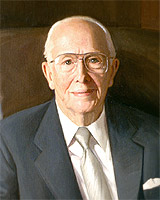|
Ezra Taft Benson was born 4 August 1899 in Whitney, Idaho. His father owned
a farm which required the labor of each family member, and Benson spent
his early life working in the fields, milking cows, and doing other
chores. After successfully completing his scholastic requirements, he
matriculated from the Oneida Stake Academy. He then attended Utah State
University before serving in the Army during World War I. Following
his discharge, he served an LDS mission to Great Britain. After two
years of full-time missionary work, he returned to the United States
and enrolled at Brigham Young University. After graduating in 1926 with honors from BYU, he and his bride, Flora Amussen, a Logan, Utah, native, traveled to Iowa State College where he completed a Master's Degree.
At twenty-seven, Benson returned to the family farm. Soon thereafter he
was appointed Franklin County Agent. By 1932 he was living in Boise,
Idaho, and serving as economist/extension specialist, directing the
marketing efforts of the University of Idaho's Extension Division. Seven
years later, in 1939, he accepted an offer to become executive secretary
of the National Council of Farmer's Cooperatives, and moved to Washington,
D.C. Not a desk-bound administrator, Benson traveled a great deal and
became acquainted with the full scope of agriculture in the United States.
As secretary to more than two million farmers, he became acquainted with
the nation's political leaders, and he also served as president of the
Mormon Church's Washington, D.C., stake.
While traveling in Utah with his two sons in 1943, he was summoned to the
office of President Heber J. Grant
of the Mormon Church, who called him to the church's Quorum of Twelve Apostles.
He was forty-four years old. Sustained at the October 1943 general conference, he and his large
family moved to Salt Lake City to be near the headquarters of the church.
Following the end of World War II hostilities in 1945, Benson was sent by LDS
Church President George Albert Smith
to Europe where he spent eight busy months coordinating relief and recovery efforts
among Mormons in Europe. This experience intensified his dislike of tyranny, cruelty,
and injustice.
In 1952 President Dwight David Eisenhower appointed Benson to the cabinet
post of Secretary of Agriculture. Partly because of his vigorous espousal
of free enterprise, he was never the most popular person in the cabinet.
Still he was known for being fair, just, and a man of principle. He
was featured on the covers of Time magazine and The Saturday Evening
Post, he and his family were guests on Edward R. Murrow's television
show, "Person to Person." Believing that "no real American wants to
be subsidized," he urged flexible price supports for agricultural products
and called on America's farmers to stand on their own feet. Surprising
critics, he survived a full eight years in the cabinet before retiring
once more to home and church duties.
Passionately opposed to communism, Benson denounced all forms of tyranny and
compulsion. He spoke out frequently advocating conservative positions and themes,
and was mentioned as a possible presidential or vice presidential candidate.
On one occasion he outlined his own political creed in the following
words: "I am for freedom and against slavery. I am for social progress
and against socialism. I am for a dynamic economy and against waste.
I am for the private competitive market and against unnecessary governmental
intervention. I am for national security and against appeasement and
capitulation to an obvious enemy."
In 1973 Benson was set apart as president of the Council of the Twelve
Apostles. He worked to streamline church policies and procedures. Then
when Spencer W. Kimball passed away
on 5 November 1985 Ezra Taft Benson became the thirteenth president of
The Church of Jesus Christ of Latter-day Saints. At eighty-six years of age
he became the second oldest man to succeed to the presidency. He called lapsed
Mormons to return to the fold. In general conference
addresses, he counseled church members to read and study the
Book of Mormon. In a humanitarian gesture, he personally
delivered a contribution of ten million dollars to President Ronald
Reagan to be used to procure food for the world's hungry.
Ezra Taft Benson, born in a quiet Idaho farm community, spent much of his
life working with the power brokers of the world. Outspoken, courageous,
and committed, he, like the founder of the Latter-day Saint church,
Joseph Smith, had gone from
"plowboy to prophet." He died 30 May 1994.
See: Reed A. Benson,
The Teachings of Ezra Taft Benson (1988); Sheri L. Dew, Ezra Taft Benson:
A Biography (1987).
|


